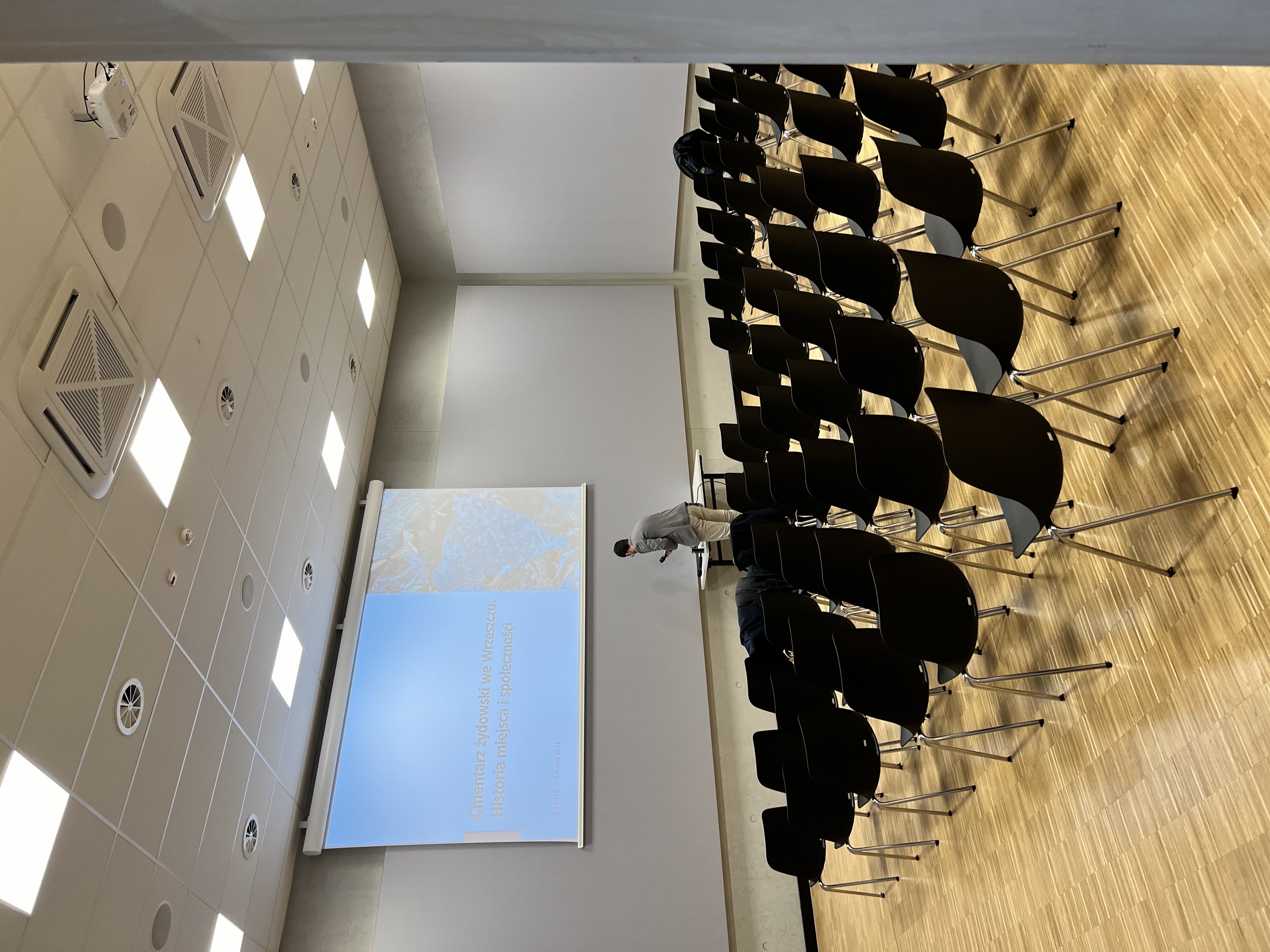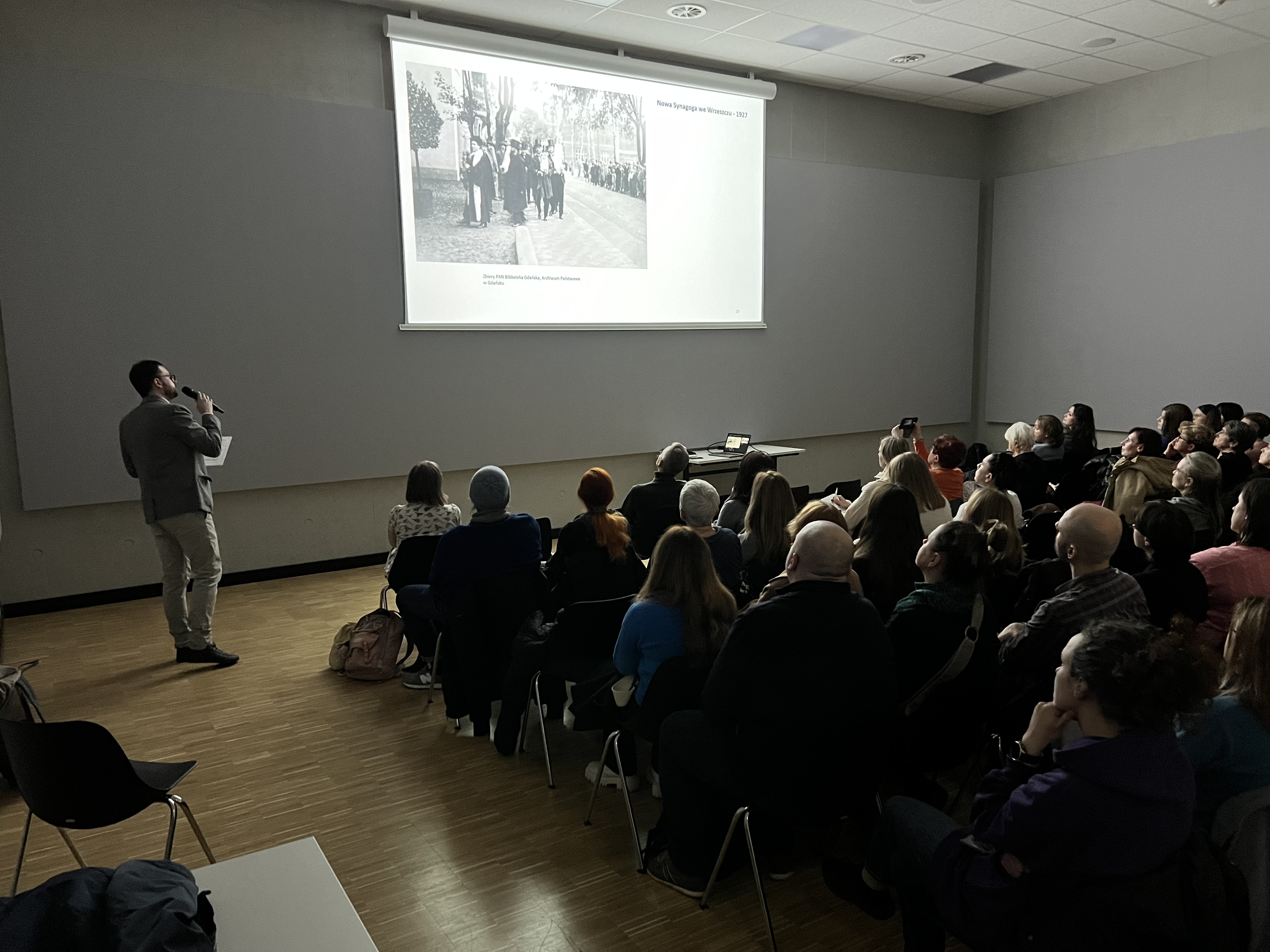Odkrywanie cmentarza żydowskiego we Wrzeszczu. Historia miejsca i społeczności.
Wydarzenie miało formę prezentacji zarysu historii Żydów w Gdańsku oraz we włączonym do Gdańska na początku XIX wieku Wrzeszczu. Omówione zostało położenie cmentarza w odniesieniu do najbliższej okolicy. Skupiliśmy się także na gdańskiej pamięci i niepamięci o Żydach i ich nekropolii. Po prezentacji zaprosiliśmy wszystkich obecnych do zadawania pytań i dyskusji o znaczeniu historii i pamięci o mniejszościach narodowych i religijnych. Spotkanie poprowadził dr Andrzej Hoja – gdański historyk, kurator i ekspert w Centrum Badań Historycznych Polskiej Akademii Nauk w Berlinie. Od 2011 roku związany z instytucjami muzealnymi z Pomorza jako kurator w Pommersches Landesmuseum w Greifswaldzie, Muzeum Miasta Gdyni, Muzeum II Wojny Światowe w Gdańsku, Muzeum Piśmiennictwa i Muzyki Kaszubsko-Pomorskiej w Wejherowie oraz Muzeum Gdańska. Od ponad dekady rozbudowuje kolekcje nagrań biograficznych w instytucjach muzealnych. Twórca działającego przy Muzeum Gdańska Gdańskiego Archiwum Historii Mówionej, którego pracami zarządza na co dzień.
Było to wydarzenie, organizowane przez fundacje Formy Wspólne w ramach projektu MultiMemo: Multidirectional Memory: Remembering for Social Justice, który realizujemy wspólnie z Fundacją Zapomniane, FestivALT, Fundacją Dokumentacji Cmentarzy Żydowskich, Fundacją Urban Memory, JCC Warszawa, CEJI a contribution to an inclusive Europe, oraz Hochschule für Jüdische Studien Heidelberg dzięki wsparciu Unii Europejskiej w ramach programu Citizens, Equality, Rights and Values (CERV).
Wydarzenie miało formę prezentacji zarysu historii Żydów w Gdańsku oraz we włączonym do Gdańska na początku XIX wieku Wrzeszczu. Omówione zostało położenie cmentarza w odniesieniu do najbliższej okolicy. Skupiliśmy się także na gdańskiej pamięci i niepamięci o Żydach i ich nekropolii. Po prezentacji zaprosiliśmy wszystkich obecnych do zadawania pytań i dyskusji o znaczeniu historii i pamięci o mniejszościach narodowych i religijnych. Spotkanie poprowadził dr Andrzej Hoja – gdański historyk, kurator i ekspert w Centrum Badań Historycznych Polskiej Akademii Nauk w Berlinie. Od 2011 roku związany z instytucjami muzealnymi z Pomorza jako kurator w Pommersches Landesmuseum w Greifswaldzie, Muzeum Miasta Gdyni, Muzeum II Wojny Światowe w Gdańsku, Muzeum Piśmiennictwa i Muzyki Kaszubsko-Pomorskiej w Wejherowie oraz Muzeum Gdańska. Od ponad dekady rozbudowuje kolekcje nagrań biograficznych w instytucjach muzealnych. Twórca działającego przy Muzeum Gdańska Gdańskiego Archiwum Historii Mówionej, którego pracami zarządza na co dzień.
Było to wydarzenie, organizowane przez fundacje Formy Wspólne w ramach projektu MultiMemo: Multidirectional Memory: Remembering for Social Justice, który realizujemy wspólnie z Fundacją Zapomniane, FestivALT, Fundacją Dokumentacji Cmentarzy Żydowskich, Fundacją Urban Memory, JCC Warszawa, CEJI a contribution to an inclusive Europe, oraz Hochschule für Jüdische Studien Heidelberg dzięki wsparciu Unii Europejskiej w ramach programu Citizens, Equality, Rights and Values (CERV).
Discovering the Jewish cemetery in Wrzeszcz. History of the place and the community.
The event took the form of presenting an outline of the history of Jews in Gdańsk and Wrzeszcz, which was incorporated into Gdańsk at the beginning of the 19th century. The location of the cemetery in relation to the immediate vicinity was discussed. We also focused on Gdańsk's memory and oblivion of Jews and their necropolis. After the presentation, we invited everyone present to ask questions and discuss the importance of history and memory of national and religious minorities. The meeting was led by Dr. Andrzej Hoja - a historian from Gdańsk, curator and expert at the Historical Research Center of the Polish Academy of Sciences in Berlin. Since 2011, he has been associated with museum institutions in Pomerania as a curator at the Pommersches Landesmuseum in Greifswald, the Gdynia City Museum, the Museum of the Second World War in Gdańsk, the Museum of Kashubian-Pomeranian Writing and Music in Wejherowo and the Gdańsk Museum. He has been expanding collections of biographical recordings in museum institutions for over a decade. The creator of the Gdańsk Oral History Archive operating at the Museum of Gdańsk, whose work he manages on a daily basis.
This was the event organized by the Common Forms foundations within the framework of the MultiMemo: Multidirectional Memory: Remembering for Social Justice project, which we are carrying out jointly with the Zapomniane Foundation, FestivALT, the Foundation for the Documentation of Jewish Cemeteries, the Urban Memory Foundation, JCC Warsaw, CEJI a contribution to an inclusive Europe, and the Hochschule für Jüdische Studien Heidelberg
thanks to the support of the European Union under the Citizens, Equality, Rights and Values (CERV) program.
This was the event organized by the Common Forms foundations within the framework of the MultiMemo: Multidirectional Memory: Remembering for Social Justice project, which we are carrying out jointly with the Zapomniane Foundation, FestivALT, the Foundation for the Documentation of Jewish Cemeteries, the Urban Memory Foundation, JCC Warsaw, CEJI a contribution to an inclusive Europe, and the Hochschule für Jüdische Studien Heidelberg
thanks to the support of the European Union under the Citizens, Equality, Rights and Values (CERV) program.






